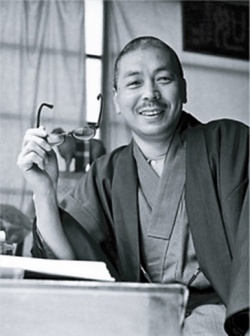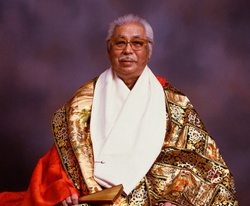Difference between revisions of "Shinjo Ito"
| Line 1: | Line 1: | ||
[[File:Shinjo_Ito.jpg|thumb|250px|left]] [[File:Master-shinjo-ito.jpg|thumb|250px|]] | [[File:Shinjo_Ito.jpg|thumb|250px|left]] [[File:Master-shinjo-ito.jpg|thumb|250px|]] | ||
<poem> | <poem> | ||
| − | Shinnyo-en's story began in 1936. [[Shinjo]] Ito was enjoying a comfortable career as an aircraft engineer, but felt a strong [[desire]] to pursue [[Buddhism]] and guide [[people]] to [[happiness]]. | + | [[Shinnyo-en's]] story began in 1936. [[Shinjo]] Ito was enjoying a comfortable career as an aircraft engineer, but felt a strong [[desire]] to pursue [[Buddhism]] and guide [[people]] to [[happiness]]. |
| − | With the support of his wife Tomoji, [[Shinjo]] began training in [[Shingon]], a major school of [[Japanese Buddhism]] founded in the 9th century CE, at the [[Daigoji temple]] complex in [[Kyoto]]. According to the [[mystical]] teachings of [[Shingon]], [[enlightenment]] is not a distant [[reality]] that can take countless lifetimes to attain. Rather, it is a part of the [[reality]] we live in. With the guidance of a genuine [[teacher]], [[enlightenment]] can be [[realized]] through practice for the [[benefit]] of oneself and others. | + | With the support of his wife [[Tomoji]], [[Shinjo]] began training in [[Shingon]], a major school of [[Japanese Buddhism]] founded in the 9th century CE, at the [[Daigoji temple]] complex in [[Kyoto]]. According to the [[mystical]] teachings of [[Shingon]], [[enlightenment]] is not a distant [[reality]] that can take countless lifetimes to attain. Rather, it is a part of the [[reality]] we live in. With the guidance of a genuine [[teacher]], [[enlightenment]] can be [[realized]] through practice for the [[benefit]] of oneself and others. |
| − | [[Shinjo]] studied [[sacred]] [[Buddhist texts]] (known as [[sutras]]), searching for one that would capture [[Shingon's]] [[mystical]] [[truths]] yet also make [[Shingon Buddhism]] accessible to laypeople. [[Shinjo]] concluded that the [[Nirvana]] | + | [[Shinjo]] studied [[sacred]] [[Buddhist texts]] (known as [[sutras]]), searching for one that would capture [[Shingon's]] [[mystical]] [[truths]] yet also make [[Shingon Buddhism]] accessible to laypeople. [[Shinjo]] concluded that the [[Nirvana Sutra]]—which focuses on the teachings of the [[Buddha]] in the final moments of his life—was the perfect text to help [[people]] understand the [[Buddha's teachings]]. The [[Nirvana Sutra]] brings together the teachings bequeathed by the [[Buddha]] on his final day; it is the [[Buddha's]] legacy and the culmination of forty-five years of [[teaching]]. The [[Buddha]] emphasizes in his final {{Wiki|discourse}} that everyone can attain [[enlightenment]], and welcomes all to the [[path]] of cultivating the [[four virtues]] of [[loving kindness]], [[compassion]], [[joy]], and [[equanimity]]. |
[[Shinjo]] often repeated the saying: "One person's [[awakening]] will [[enlighten]] countless others." This articulates the [[Buddhist]] [[principle]] of [[interdependence]] and the underlying {{Wiki|altruistic}} [[philosophy]], central to [[Shinnyo]] [[Buddhism]], that true [[spiritual]] practice brings [[joy]] to oneself and others. [[Shinjo]] believed that each of us possesses the potential for [[spiritual]] [[awakening]], and directed his [[energy]] to helping [[people]] cultivate that potential. | [[Shinjo]] often repeated the saying: "One person's [[awakening]] will [[enlighten]] countless others." This articulates the [[Buddhist]] [[principle]] of [[interdependence]] and the underlying {{Wiki|altruistic}} [[philosophy]], central to [[Shinnyo]] [[Buddhism]], that true [[spiritual]] practice brings [[joy]] to oneself and others. [[Shinjo]] believed that each of us possesses the potential for [[spiritual]] [[awakening]], and directed his [[energy]] to helping [[people]] cultivate that potential. | ||
</poem> | </poem> | ||
Revision as of 19:59, 14 December 2013
Shinnyo-en's story began in 1936. Shinjo Ito was enjoying a comfortable career as an aircraft engineer, but felt a strong desire to pursue Buddhism and guide people to happiness.
With the support of his wife Tomoji, Shinjo began training in Shingon, a major school of Japanese Buddhism founded in the 9th century CE, at the Daigoji temple complex in Kyoto. According to the mystical teachings of Shingon, enlightenment is not a distant reality that can take countless lifetimes to attain. Rather, it is a part of the reality we live in. With the guidance of a genuine teacher, enlightenment can be realized through practice for the benefit of oneself and others.
Shinjo studied sacred Buddhist texts (known as sutras), searching for one that would capture Shingon's mystical truths yet also make Shingon Buddhism accessible to laypeople. Shinjo concluded that the Nirvana Sutra—which focuses on the teachings of the Buddha in the final moments of his life—was the perfect text to help people understand the Buddha's teachings. The Nirvana Sutra brings together the teachings bequeathed by the Buddha on his final day; it is the Buddha's legacy and the culmination of forty-five years of teaching. The Buddha emphasizes in his final discourse that everyone can attain enlightenment, and welcomes all to the path of cultivating the four virtues of loving kindness, compassion, joy, and equanimity.
Shinjo often repeated the saying: "One person's awakening will enlighten countless others." This articulates the Buddhist principle of interdependence and the underlying altruistic philosophy, central to Shinnyo Buddhism, that true spiritual practice brings joy to oneself and others. Shinjo believed that each of us possesses the potential for spiritual awakening, and directed his energy to helping people cultivate that potential.

